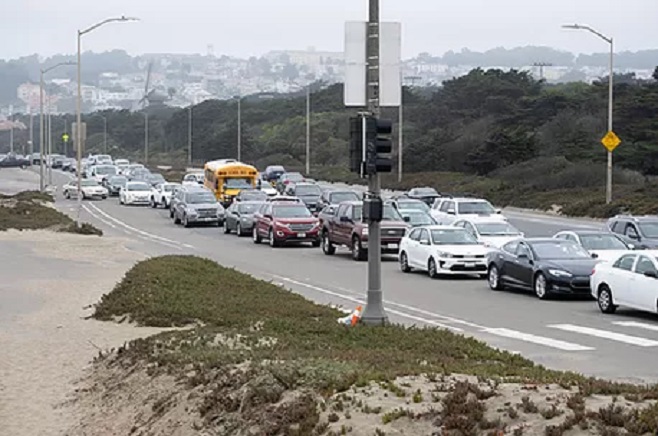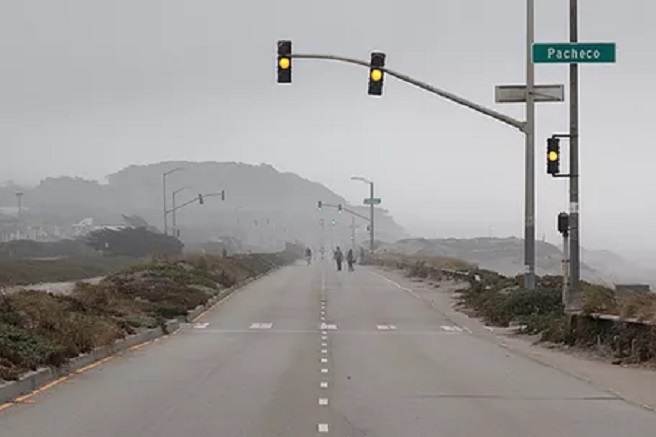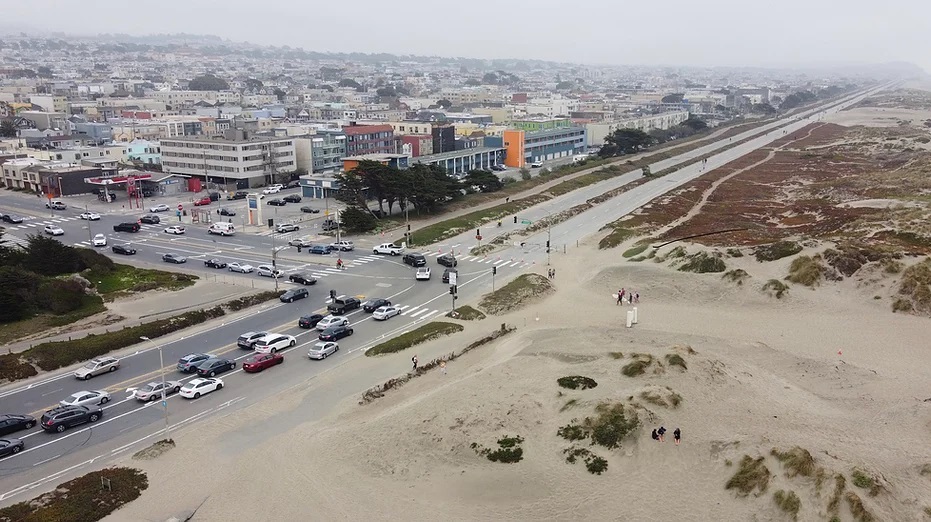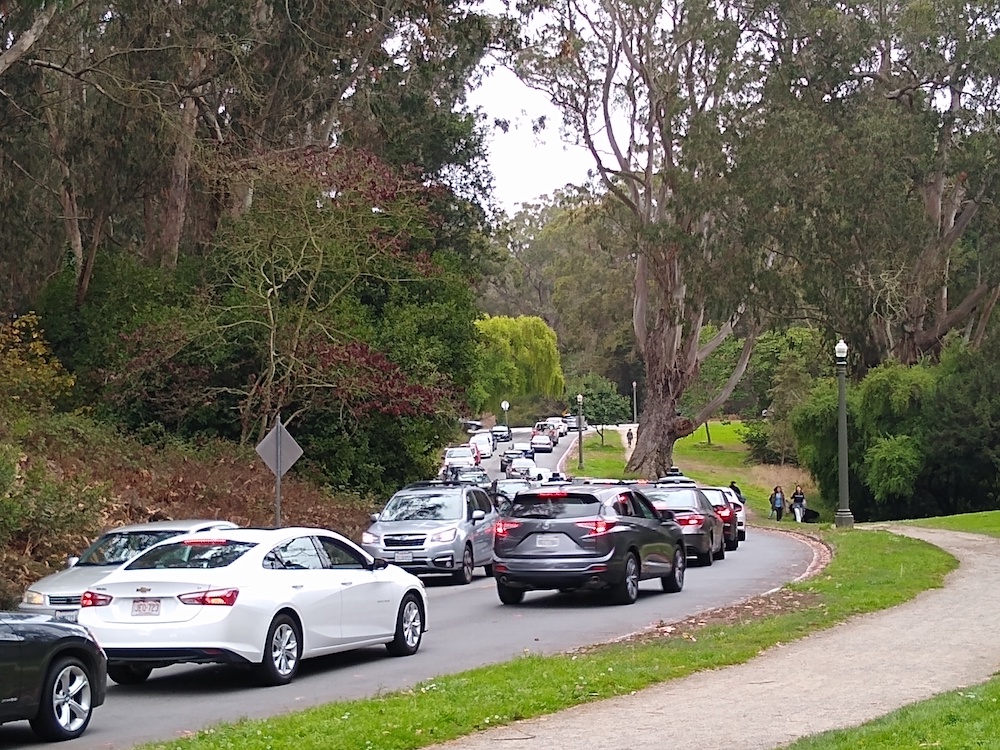Climate advocates in San Francisco have been making a big mistake in shutting down the Great Highway and other westside transit corridors. They have pushed for destructive policies that not only are ineffective in reducing our carbon emissions footprint, but have been hurting working people and provoking a backlash.
That reaction may well endanger the re-election chances of Supervisors Gordon Mar and Connie Chan, and fracture the progressive majority on the Board of Supervisors. Recall fever is in the air like wildfire smoke, and progressives ignore these tell-tales at their peril. The real shame is that a compromise could accommodate all the various needs, but poor leadership and devious city agencies have obstructed that possibility. The current deal for a week day-weekend sharing of the Great Highway, brokered by Mayor London Breed over the howls of bike activists, is a short-term fix that doesn’t solve the complex issues but has (temporarily) defused the politics. San Francisco is facing serious and complex climate change challenges, and the ham-fisted efforts exhibited by a number of political leaders does not offer confidence that this city’s managers possesses the vision, innovation and consensus-building capacity to get this right.

I consider myself a climate advocate, but watching the Great Highway politics unfold has reminded me of the failed effort of French president Emmanuel Macron when he implemented a thoughtlessly designed nationwide gas/carbon tax. That policy ended up impacting the rural areas of France harder than the cities because of a lack of mass transportation in those areas. That inspired months of massive nationwide protests by working class people, who blocked roads, gas stations and shut down much of the country. The grassroots movement became known as the Yellow Vest movement (gilets jaunes), because many protestors wore yellow emergency vests. Macron repealed the carbon tax under immense political pressure, and the Yellow Vests sounded an international warning of how well-meaning policies can undermine the climate change cause if policymakers do not account for impacts on everyday people.
A similar situation has been happening on San Francisco’s west side. During the COVID-19 pandemic, District 4 Supervisor Gordon Mar pushed in April 2020 to shut down the Great Highway and other streets to create a place for people to recreate. That policy had widespread support from Districts 1, 4 and 7, the neighborhoods most affected, since many people suddenly were working from home instead of commuting to work.

But following widespread vaccinations and re-opening of the economy, people began returning to their physical workplaces. As traffic and congestion increased to pre-pandemic levels, westside residents discovered that their elected representatives and city agencies like the Recreation and Parks Department and Municipal Transit Authority had pulled a fast one. Pushed by the SF Bicycle Coalition, they initiated a permanent shutdown of the Great Highway and other transit corridors. In classic “shock doctrine” fashion, they used the pretext of an immediate crisis – a virus pandemic — to ram through a completely unrelated land use policy. In a bait-and-switch, advocates now insisted this was necessary to fight climate change.
Besides being sneaky and relying on fake, manufactured data, there is another major problem with this “progressive” plan – it has become clear that Great Highway closure actually is far worse for climate change.
Pre-pandemic,18,000 drivers used the Great Highway every day (20,000 on the weekend, over a half a million drivers per month). These are working people, parents, families, the elderly and partially abled, who need to commute to their jobs, doctors appointments, take their kids to school, to the grocery store and more. When the Great Highway is closed, all those thousands of cars are diverted directly into the Sunset neighborhood. Once quiet streets suddenly were bursting with thousands of angry and frustrated drivers, loudly racing up and down Lincoln Way (past my house!) at frantic rates of speed, not fully stopping at Stop signs.
They also have been commuting through the middle of Golden Gate Park (Chain of Lakes and Crossover Drives) in bumper to bumper traffic, violating Park and Rec’s own master plan to protect the Park from non-park traffic. People’s autos have been stuck in stop-and-go congestion on Sunset Boulevard, and delivery trucks and big rigs that once used the Great Highway have been rushing along the surface streets of the Sunset neighborhood, right outside people’s front doors, creating unprecedented traffic and noise. Hot rodders and motorcycles that used to show off along the long stretch of the Great Highway now race through surface streets.
Commuters are taking 20-30 minutes longer each way, which means more carbon emissions. Constantly re-accelerating all of those vehicles, tens of thousands every day, uses up a lot more fuel and emits a lot more carbon. Any climate expert knows that bumper-to-bumper and stop-and-go traffic is worse for carbon emissions. Thousands of working people drive significant distances that are not conducive to riding a bicycle, walking, or taking SF’s spotty public transportation (which has still not been restored to full service from cutbacks during the pandemic).
I spoke with Daniel, a Filipino worker from southern San Francisco, who told me, “I work at the Veterans Administration Hospital, and so do others from my neighborhood. Closing the Great Highway has added 30 minutes to my commute each way, one hour total. It’s crazy.” Closure advocates have said that residents will eventually adjust to the “new normal,” but it hasn’t worked out that way. Rerouting traffic has been like squeezing a balloon: you squeeze it in one place, it pops out somewhere else. Bizarrely, SF has tried to create a “park” out of a highway and turned an actual park into a highway.
The real solution to reducing San Francisco’s climate footprint is to get people out of their cars by massively increasing public transportation. So what has the Board of Supervisors done toward that goal? Precious little. I have lived in a number of cities, and San Francisco has one of the worst public transportation systems for a city its size. The Outer Sunset in particular is the most Muni-underserved part of San Francisco. Look at any Muni map, and see the vast blocks of under-served areas on the west side.
Instead city officials are engaging in symbolic, feel-good politics to compensate for the fact that the mayor and Board of Supervisors done virtually nothing to fund a massive increase in public transportation. Janice Li of the Bicycle Coalition got it completely wrong when she said, “The pressing reality of climate change…means that the Great Highway needs to stay open” to bicycles/pedestrians and closed to automobiles. But closing the Great Highway does nothing to reduce SF’s carbon emissions. In fact, it makes it worse.

Besides these everyday impacts, what has aroused Yellow Vest outrage is the blatant way in which city agencies have used bogus research and biased presentations to ram through their agenda. No environmental impact reports been made of the various proposed closure options, a fact that the Sierra Club has criticized. No attempt has been made to assess the impact on those 18,000 drivers and their families. One report by the San Francisco County Transportation Authority claimed that 52% of Sunset residents are actually in favor of closing the Great Highway to vehicles. Buried deep in the report was its methodology, which revealed the survey had been distributed through its website, by email, and social media – not through modern methods of professional sampling or phone calls. How many regular people pay attention to the SFCTA website, or are on its email list or social media feeds? Only a small handful of professionals, including advocacy groups like the Bicycle Coalition. Their members participated as a self-selected audience, resulting in a “captured” survey which nevertheless has been widely reported in the media as proof of the policy’s popularity.
Meanwhile, city agencies and the media have ignored that the westside Yellow Vests have collected over 13,000 signatures opposing the closure, most of them from residents of Districts 4 and 1 (link to the petition). I have witnessed their leafleting and visibility pickets at key intersections, where 80 to 90% of motorists stuck in traffic give a thumbs up or honk their horn in support.
While the closure was popular during the pandemic, recently the Great Highway has seen shrinking use by bicyclists and pedestrians – yet the agencies have tried to hide that fact. A public records (Sunshine Ordinance) request submitted to Rec and Park (which the agency stonewalled for nearly 2 months), found that Great Highway usage has declined dramatically, by over half. From a peak of 144,000 users per month from October 2020 through January 2021, that number plummeted to 109,000 in March 2021, and then to 62,000 in May 2021, a decline of 57%. This significant drop-off was confirmed by a second study of anonymized cell phone data.
Anyone who actually lives in the Outer Sunset understands why: the foggy, windy, chilly climate near the beach is often nasty for bicycling and walking. On most days, the Great Highway is so devoid of bicyclists and pedestrians that the Outer Sunset locals derisively refer to the roadway as the Great Nobody. But even if the bicyclists/pedestrians had maintained peak usage, that pales in comparison to the 18,000 vehicles per day/550,000 per month. And since many of those autos have more than one passenger in the car, the number of people traveling north-south on the Great Highway likely reaches three quarters of a million per month. Where are all of those people supposed to go, if the Great Highway is permanently closed, as some Supervisors, agencies and organizations have proposed?

In essence, what this misguided land use policy is trying to do is to take a major north-south thoroughfare used by 18,000 commuters every day — and all hours of the day — and turn it over exclusively to a handful of bicyclists and some pedestrians who mostly use it seasonally, and not at night, in the early morning or even in the middle of most inclement days. How would residents of Supervisor Dean Preston’s District 5 like it if a decision was unilaterally made to shut down Oak Street to cars and trucks? Or the Embarcadero in D6, Mission Street in D10, Columbus Avenue in D3? Would the residents of those districts easily adjust to the “new normal”?
The Westside Yellow Vests are made as hell, but a real compromise is still possible. Mayor London Breed’s short-term solution allows auto traffic Monday through Thursday and half of Friday. It’s a start, but it makes no sense that the Great Highway is closed to automobile traffic all Sunday night until 6 AM on Monday morning, since there are few bicyclists/pedestrians during the nighttime hours. And the Friday noontime closure should be extended into the early evening, to allow commuters to get home for their weekend. Also, to reduce bumper to bumper traffic through the heart of Golden Gate Park, it is crucial to reopen Martin Luther King Drive. Since the pandemic, closures of MLK Drive and 41st Ave have cut off three out of five of the exits from the Park. Now, with traffic flows back to normal, these continuing closures are contributing greatly to congested traffic and increased carbon emissions. I live across the street and have never had problems biking and walking on MLK Drive, since it is a wide street with low traffic when all exits to the park are open.
Longer term, a redesign of the four lanes, berms and existing bike lane of the Great Highway would allow a shared use area that can accommodate all the various needs. It will cost some money, but San Francisco has a budget of $13 billion and can afford it since it will result in a win-win.
Like many other coastal cities, San Francisco will need to make some tough choices over climate mitigation. The Great Highway Extension connecting to Highway 35 also needs to be addressed, and here again we already see a familiar pattern of city agencies fixing the data to rig their desired conclusion to close that important roadway to vehicles and install another highway-based “park” (more on this in a future article). San Francisco badly needs an honest attempt to address the needs of all stakeholders, and to reach consensus over climate and transportation policies that allow for multiple use and sharing of the urban ecosystem. With such a crappy public transportation system, automobiles are not disappearing anytime soon, and the anger of the Westside Yellow Vests, along with multiple recalls at local and state levels, are a warning to San Francisco progressives.
Steven Hill (www.Steven-Hill.com) is a 25 year resident of the Outer Sunset, and the architect of San Francisco’s ranked choice voting system and public financing of campaigns.





